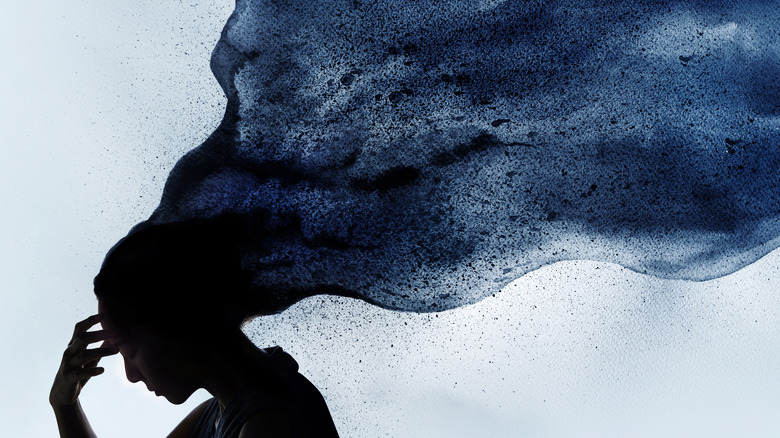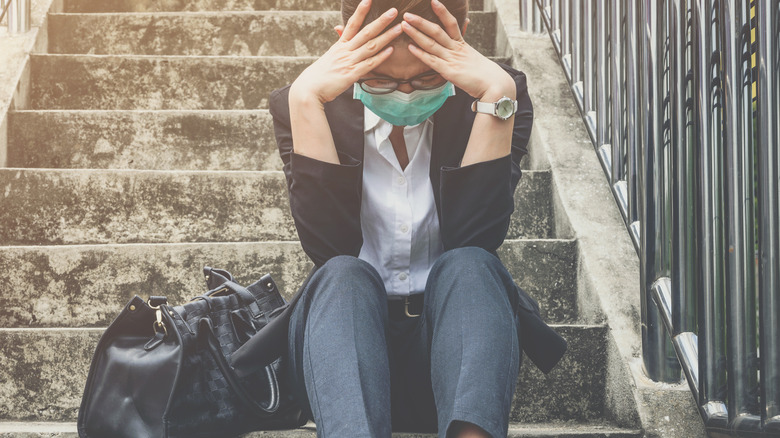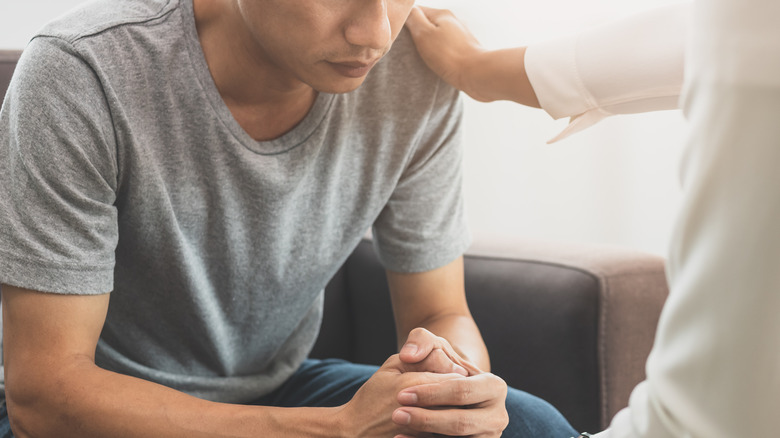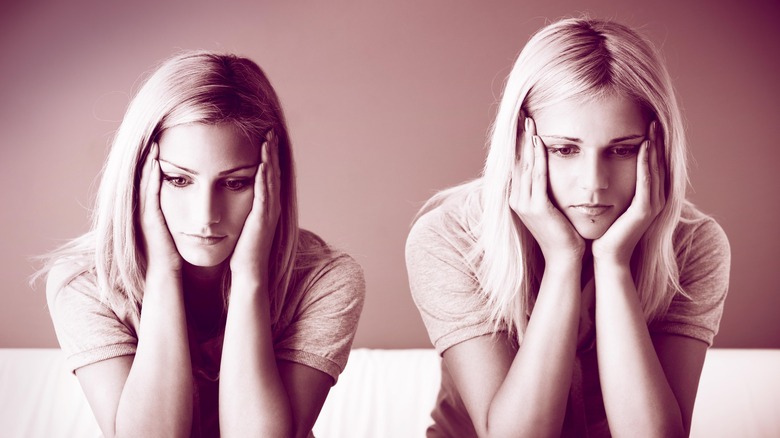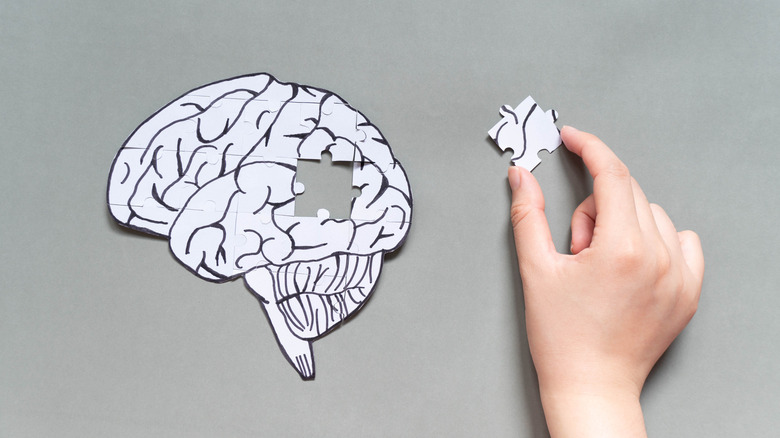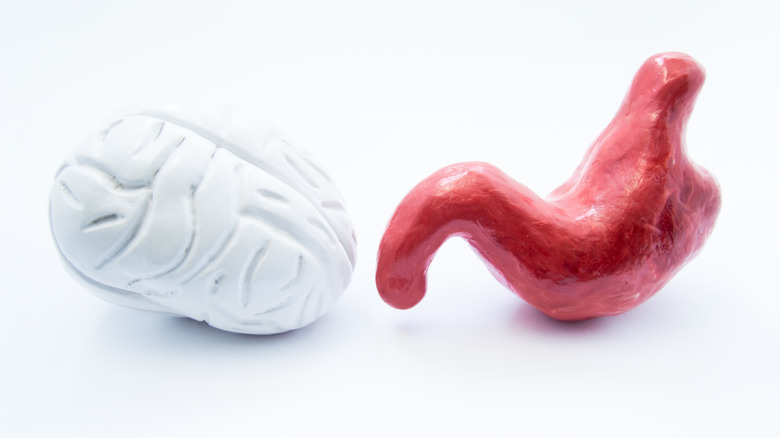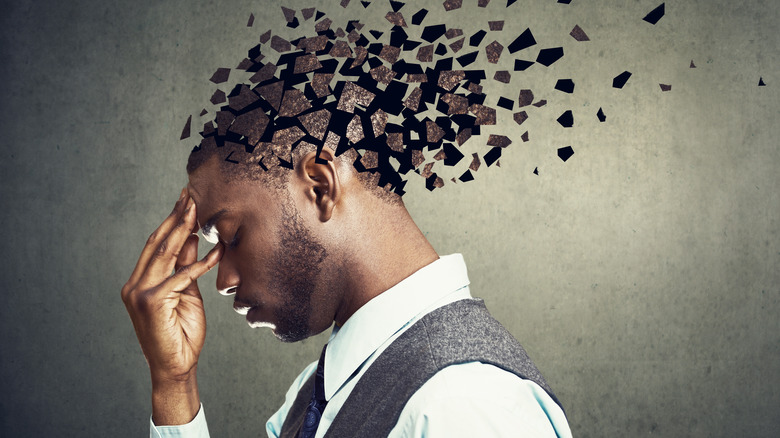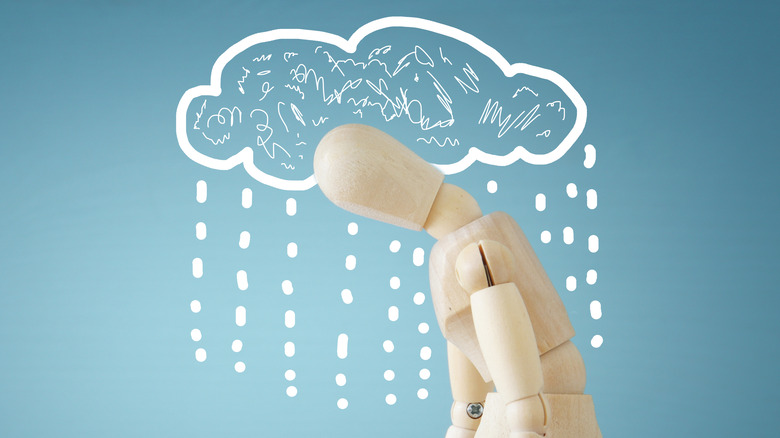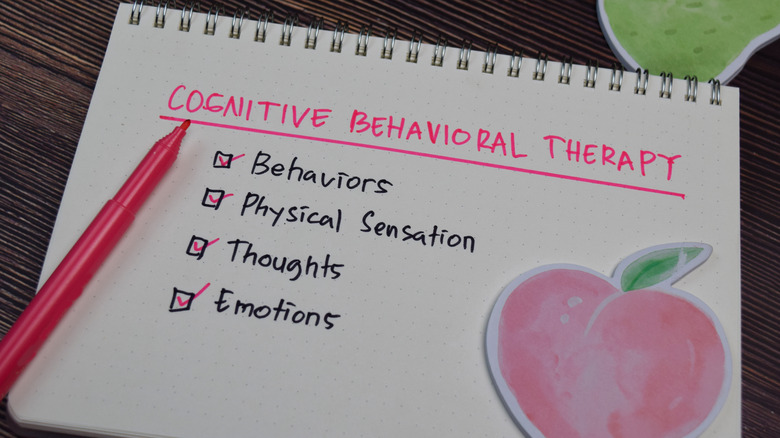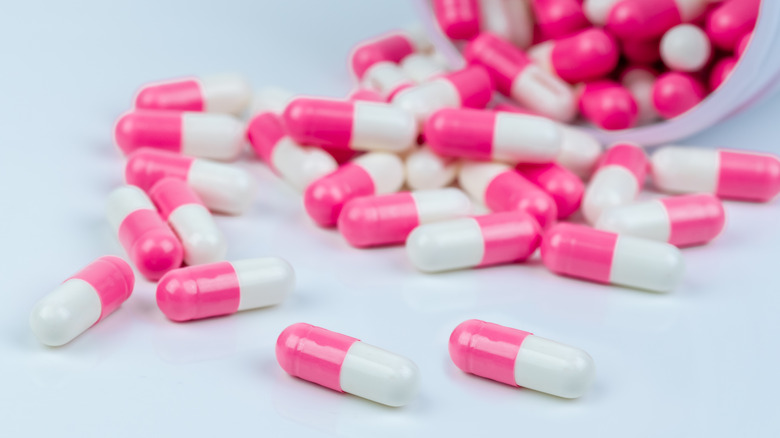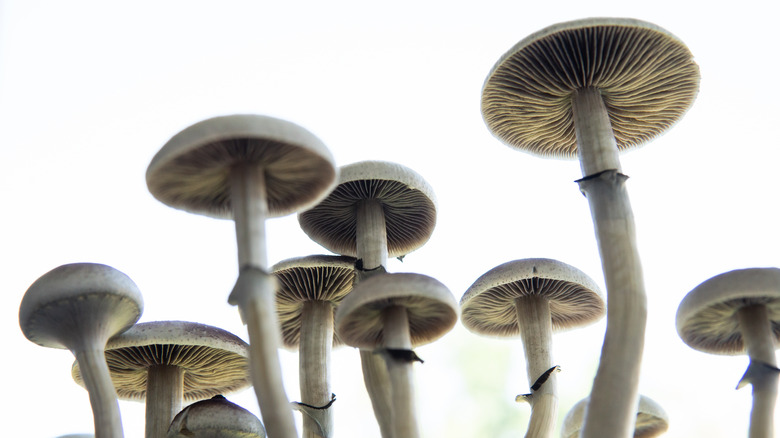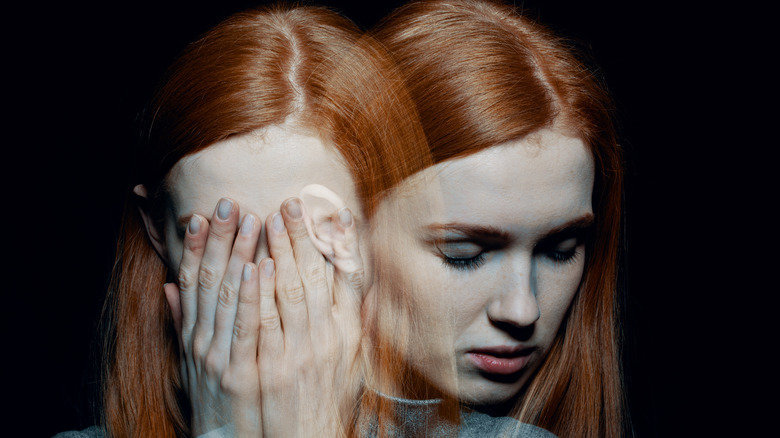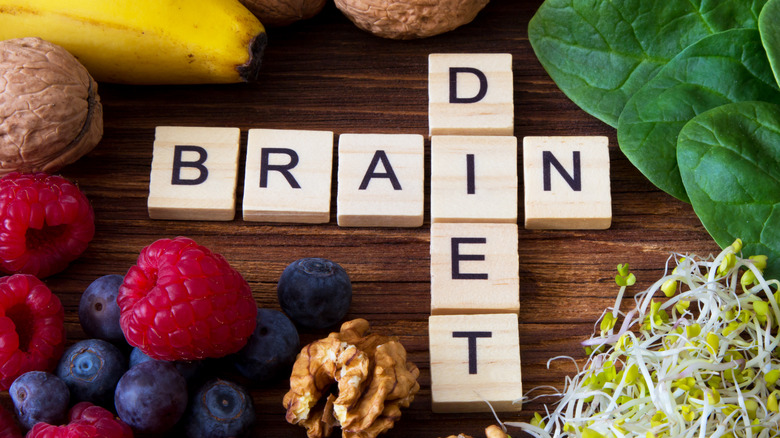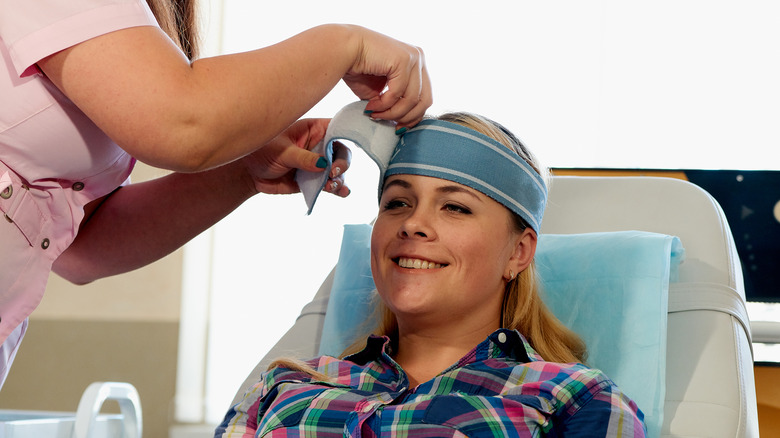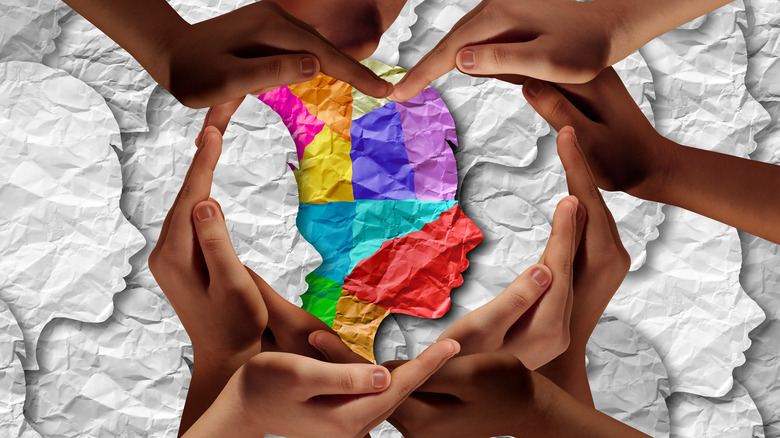Depression Explained: Causes, Symptoms, And Treatments
Depression has been around since the dawn of human civilization — perhaps as long as consciousness itself (via Ancient Origins). The Greeks referred to it as "melancholia." The Romans called it "deprimere," which is Latin for "to press down" (per Florida Today). An ancient Egyptian poem even alluded to thoughts of suicide (via Discover Magazine). Human beings have been trying to make sense of the condition for centuries — and many creative works have attempted to depict what it's like to be in its throes.
The National Institute of Mental Health defines depression, also known as major depressive disorder, as a common but serious mood disorder that interferes with, and at times wreaks havoc on, daily life and functioning. What can make the illness particularly isolating and despairing is the idea that it's "all in the head." Unseen and invalidated, a mental health problem like depression can sometimes escape the sympathy that's more generously granted to those struggling with physical ailments like the flu or a broken leg.
Depression rates have shot up by nearly 28% since the onset of the COVID-19 pandemic in January 2020, taking a devastating toll on the mental health of millions of people, reports a 2021 study in The Lancet. Despite years of valuable scientific research investigating its etiology and treatment, the precise pathology of the illness remains somewhat of a mystery. But here's some of what we do know so far about depression, including its signs and symptoms, causes, and available modes of treatment.
The different types of depression
When people talk about depression, they're usually referring to major depressive disorder, which affects an estimated 6.7% of American adults in any given year (via Inter Press Service). This is the most commonly diagnosed type of depression, according to the Anxiety & Depression Association of America. But the condition can take on various outfits. Persistent depressive disorder, once known as dysthymia, is another type of depression that typically involves low mood and cognitive changes that have gone on for at least two years, but hasn't reached the same level of severity as major depression. People are usually able to coast through their daily lives while feeling down and depleted most of the time. This is sometimes accompanied by physical symptoms like a loss of appetite, poor concentration, and fatigue.
Premenstrual dysphoric disorder is another intense form of depression that's unique to women, per the Anxiety & Depression Association of America. It includes a host of emotional, behavioral, and physical symptoms that set in just before menstruation and can heavily impact an individual's level of functioning. Likewise, postpartum depression is largely driven by reproductive hormones, often emerging in the weeks or months after a woman has given birth, but one in ten men also suffer from the condition (via WebMD). Bipolar disorder — formerly known as manic-depressive disorder — involves bouts of depression intermixed with mania (via WebMD). Antidepressants and mood-stabilizing medication are usually prescribed to manage mood swings that oscillate between euphoria and hopelessness.
Depression is different from grief
Depression and grief can look very similar on the face of it, but there are key differences. And making a distinction can go a long way in helping people receive appropriate care and support (via Depression and Anxiety). Those who are grieving or dealing with depression often experience feelings of sadness and spend more time alone. Grief is a natural reaction to a significant loss. In depression, however, people tend to grapple with other painful emotions that aren't necessarily related to losing someone, such as guilt, worthlessness, or anhedonia.
A particular point of distinction is that grief can come and go in bouts. It's usually sparked by specific memories and diminishes over time, whereas depression tends to be more pervasive and all-consuming, and doesn't necessarily dissipate in certain situations. While there's a fine line between grief and depression, the two can exist side by side. The previous bereavement exclusion criterion for the diagnosis of depression was removed from the Diagnostic and Statistical Manual of Mental Disorders (DSM-5), since researchers and clinicians now acknowledge that the condition can just as easily be precipitated by grief and loss as it can be triggered by a stressful or traumatic event.
If you've been feeling down for a while and it's impacting your ability to function, be sure to reach out to your healthcare provider. This is particularly important to do if you've been struggling with thoughts of self-harm and suicide, advises the Anxiety & Depression Association of America.
The science behind the winter blues
Depression can feel like an eternal winter, shrouded in fog and grayness. The connection between weather and mood goes beyond the metaphorical: Seasonal affective disorder (SAD) is a subtype of depression affecting between 6.3% and 10.3% of people in Western societies (via BJPsych Open). Changes in mood are often brought about by fewer daylight hours during the autumn and winter months. People struggling with the condition tend to feel low and listless and even the sight of a dull, cloudy day can evoke a sense of gloom.
Low levels of vitamin D are suspected to be at the root of SAD, according to a 2020 review study. There's evidence that the brain produces less serotonin in the darker months, which is the "happy" neurotransmitter that regulates our mood. Sunlight keeps available serotonin levels high by reducing serotonin transporter (SERT) activity, reports a study using positron emission tomography (PET) brain scans on SAD patients. A lack of sunlight can also mess with your body's circadian rhythms, throwing your sleep-wake cycle out of whack (via Anticancer Research).
Unsurprisingly, sunshine is an effective form of therapy for SAD, as is "light therapy," which has antidepressant effects due to its ability to stimulate serotonin (via Neuroscience Bulletin). From Hippocratic medicine to modern science, the evidence continues to suggest that "the sun is the best remedy" — and topping up your vitamin D levels with supplementation may just be the next best thing, says a 2010 study.
Depression has a high degree of heritability
"We do not really know what causes depression ... We do not know how depression made it through the evolutionary process," says psychology writer Andrew Solomon in his memoir "The Noonday Demon: An Atlas of Depression" (via The New York Times). Most researchers concede that depression is likely caused by a combination of genetic, biological, environmental, and psychological factors (via JAMA Network Open). But it's evident that some people are more susceptible to the illness than others. Family and twin studies have shown that first-degree relatives such as children or siblings of people with depression have a three-fold higher risk of developing depression than the average person (via Frontiers in Psychiatry). One meta-analysis suggests that the heritability rate is 37% and it's likely to be even greater for severe depression.
Based on the findings of a 2019 study, researchers have discovered numerous potential genetic variants associated with depression. Yet, there's no real evidence of a single "depression gene" (via The American Journal of Pyschiatry). Instead, multiple genes might contribute to a person's risk of depression when they interact with environmental factors and other aspects. Scientists admit that more research is needed to really pin down the relationship between genetics and depression.
The role of brain chemistry
You may have heard people describe their depression as a "chemical imbalance" before (via Journal of Humanistic Psychology). This is particularly common among those who don't feel like they have a good reason to be depressed and struggle to pinpoint a valid cause. It may feel like their minds are conspiring against them. In some cases, depression can stem from dysfunctional brain chemistry, according to research. For instance, depressed people may be deficient in certain brain chemicals like serotonin, the "happy" neurotransmitter. Many antidepressants like selective serotonin reuptake inhibitors (SSRIs) work by increasing serotonergic activity in the brain. Dopamine is another substance that may bring on depression (via International Journal of Neuropsychopharmacology). The brain's "reward" molecule creates positive feelings that reinforce satisfying behavior and drive us to repeat pleasurable activities, but when dopamine levels are low, people can feel unmotivated and anxious.
However, emerging evidence hints that neither serotonin nor dopamine are the main players in development of depression. After all, today's medications only work 50% of the time (via Nature). A 2020 study implicated low levels of GABA in depression, demonstrating a new pathway of antidepressant action via a new medication that boosts the steroid allopregnanolone, activating the brain's GABA receptors (via Neurobiology of Stress).
Is there a link between our gut bacteria and mood?
The bustling ecosystem of microbes in our guts has been linked to a vast range of health conditions (via Cureus). Researchers have even identified its possible influence on our mental wellbeing. Studies show that people with inflammatory diseases like Inflammatory Bowel Disease (IBD) are more prone to depression than others, and that the composition of our gut microflora may play a key role in orchestrating how we think and feel.
A study published in Nature Microbiology discovered that people diagnosed with depression were missing two strains of gut bacteria, Coprococcus and Dialister (while taking into consideration the effects of antidepressants). However, these bacteria were found to be present in the guts of most healthy subjects. Although the study doesn't establish whether the absence of the microbes causes or is the result of an individual's compromised mental health, it lends support to the gut-brain axis. It's believed that our gut bacteria might be responsible for producing neurotransmitters like dopamine and serotonin, which can affect our mood (via Cureus). The findings could pave the way to a new treatment approach for depression using probiotics with specific bacterial strains that aim to alter the gut's microbiome community, say researchers.
How stress can lead to depression
Some people are be able to attribute their depression to a stressful or traumatic event from the past. The diathesis stress model represents another theory about the origins of depression that suggests that certain individuals have a vulnerability to depression (via Alcohol and Alcoholism). Thus, prolonged exposure to violence, abuse, or hardship — or even a single traumatic experience — can spark depressive symptoms in them. Their "diathesis" might be biological, genetic, psychological, or even due to a specific personality feature (via Clinical Psychology Review).
Equally, multiple risk factors can interact with different stressors across a person's life to give rise to depression (via Molecular Psychiatry). This theory makes sense of why each person responds uniquely to challenging experiences — the same situation may precipitate depression in one person yet have no notable negative effects on another. A 2020 study highlighted that although the response to COVID-19-specific stressors hasn't necessarily been worse in psychiatric patients, the pandemic has ultimately had the harshest effect on people with similar levels of depression, rumination, loneliness, and well-being as psychiatric patients.
If you or someone you know is struggling with mental health, please contact the Crisis Text Line by texting HOME to 741741, call the National Alliance on Mental Illness helpline at 1-800-950-NAMI (6264), or visit the National Institute of Mental Health website.
The impact of dysfunctional beliefs
Distorted thoughts are said to be at the root of depression. The Buddha once taught: "All experience is preceded by mind ... Speak or act with a peaceful mind, and happiness follows" (via Tricycle: The Buddhist Review). Likewise, Beck's cognitive theory of depression holds that the condition is a product of maladaptive beliefs, assumptions, and judgments about oneself and the world (via Procedia – Social and Behavioral Sciences). These beliefs tend to be automatic and can have a knock-on effect on a person's emotional state and behavior, leading to depressive symptomology. A 2019 study lent support this theory, demonstrating that unhelpful thinking patterns can have a detrimental impact on the mental wellbeing of patients with inflammatory bowel disease, exacerbating their depression.
From the cognitive-behavioral perspective, depressed people think differently to non-depressed folks. In particular, they hold negative "schemas" that they constructed at some point in the past, usually in childhood, which are beliefs and expectations that were cultivated in light of a traumatic experience (via BJPsych Bulletin). This affects the way they judge and interpret different experiences and makes it easy for them to view the world with a negative bias, remembering and honing in on pessimistic details far more than positive ones. These dysfunctional thoughts are what make a person more likely to develop depression in response to a distressing situation such as the loss of a loved one or being fired.
The effectiveness of talk therapy
Psychotherapy — called "therapy" for short — is the first-line treatment for clinical depression. The various different approaches include cognitive-behavioral therapy (CBT), interpersonal, psychodynamic, problem-solving, behavioral activation, "third wave" therapies, and non-directive supportive counseling — and there's evidence of efficacy for all these interventions, reports a 2021 study from the journal World Psychiatry. Psychotherapy is often used as a standalone treatment for mild depression whereas a combination of psychotherapy and pharmacotherapy is the preferred choice for moderate to severe depression. Different techniques will resonate with different people.
A licensed and trained therapist can help you identify, understand, and work through the specific issues at the root of your symptoms, notes the American Psychological Association. In response to the dilemma of limited accessibility to services, various digital platforms such as BetterHelp now offer psychotherapy services online and have been shown to yield improvements in depression symptoms (via JMIR mHealth and uHealth). The Anxiety and Depression Association of America (ADAA) runs its own anonymous, peer-to-peer support group where users can seek advice and chat with people with similar experiences. This can be accessed on your desktop or downloaded via the iOS app. There are also peer support chat platforms like Supportiv where people who can't afford or access therapy can reach out to trained moderators who will listen and offer emotional support and validation. If you're considering using an online company, it doesn't hurt to do some research beforehand to ensure that your privacy is protected.
Cognitive behavioral therapy: the gold standard in treatment?
Cognitive behavioral therapy (CBT) is a form of psychotherapy that helps people adjust how they think (via Frontiers in Psychiatry). Born out of Beck's cognitive theory, CBT is based on the premise that our emotions and behaviors arise from our thoughts. Thus, people can tackle their depressive symptoms by reformulating their thoughts and beliefs. Patients work with a therapist to identify, challenge, and reframe the thought patterns that most likely underlie depression, including automatic negative responses, black and white thinking, catastrophizing and minimizing problems, overgeneralization, and various other cognitive distortions (via Indian Journal of Psychiatry).
A meta-analysis of 115 studies found that CBT is effective both as a long-term and short treatment modality for depressive disorders (per Indian Journal of Psychiatry). It's generally considered the "gold standard" for the treatment of most mental health disorders including depression. However, there's no definitive evidence that CBT is more effective than other psychotherapies (via JAMA Network).
Another adaption of CBT is dialectical behavior therapy orDBT (via Journal of Child and Adolescent Psychopharmacology). It was initially devised to treat patients with a borderline personality disorder, but it's also been successful at reducing depressive symptoms and suicidal ideation, based on a 2020 study.
The drugs do work (for some people)
Medication can be an effective treatment option for some people, particularly when their symptoms are severe (via JAMA Psychiatry). At the same time, research has found dramatic variation in how patients respond to antidepressants. For some people, their depressive symptoms diminish or disappear entirely, whereas over 50% of patients either see little improvement or feel worse over time. So, it's important for doctors to personalize treatments to the unique characteristics of the individual patient.
Studies confirm that pharmacotherapy is usually most potent when combined with psychotherapy (via Indian Journal of Psychiatry). There are various types of drugs available for the treatment of depression, including selective serotonin reuptake inhibitors (SSRIs), selective serotonin and norepinephrine inhibitors (SNRIs), tricyclic antidepressants, monoamine oxidase inhibitors (MAOIs), and more (via American Family Physician). No single medication has been proven to be the most effective. Your doctor can help you establish which drug or combination of drugs may be most suitable for you.
Antidepressants like SSRIs and SNRIs work on the brain's neurotransmitter systems, and are known to be safer than older antidepressant drugs like tricyclic antidepressants and monoamine oxidase inhibitors (MAOIs). But all medication can be a double-edged sword, inducing unpleasant side effects. Stopping your medications too quickly can lead to withdrawal symptoms or cause a rebound in depression, and some people even reported "brain zaps" (via Psychiatrist.com). It may be wise to slowly taper off your drugs over several weeks or months.
Psilocybin's antidepressant properties
The use of psychedelics to treat depression may have once been considered "out there," but research is adding more and more evidence to the case of psilocybin — the hallucinogenic compound found in "magic" mushrooms.
A 2020 study discovered that magic mushrooms delivered alongside supportive psychotherapy can reduce depression symptoms, with about half of participants achieving remission (via JAMA Psychiatry). The treatment had few adverse side effects compared to traditional antidepressants, even relieving symptoms in those who didn't respond to conventional therapies like talk therapy or pharmacotherapy. Researchers are now exploring psilocybin-assisted psychotherapy to treat frontline healthcare workers burdened by COVID-related depression (via TIME).
Although psychedelic drugs are on the cusp of crossing over into mainstream psychiatry, they may be the "oldest class of psychopharmacological agents known to man," used medicinally and ceremonially in indigenous cultures for millennia (via Pharmacological Reviews). Serotonergic psychedelics like psilocybin, LSD, DMT, and ayahuasca may have therapeutic outcomes by working on the brain's serotonin receptors, per a 2021 study from World Psychiatry. They produce visual and auditory hallucinations, which can create a mystical experience, and a "loosening sense of boundaries between (oneself) and the world" as well as "a sense of unity and interconnectedness," note the study authors. A bit like antidepressants, psychedelics promote a long-lasting increase in neuronal connections that are often compromised by depression. But researchers emphasize the need for "structured use" of hallucinogens, including appropriate guidance and knowledge of the powerful effects of these substances (via Pharmacological Reviews).
Ketamine raises hopes as an effective treatment
Another psychoactive substance that's been studied extensively in recent years is the once-taboo party drug ketamine (via JAMA Psychiatry). Unlike most traditional medications which can take several weeks to work, a single dose of ketamine can lift depressive symptoms in just a few hours. Moreover, its effects last somewhere between a few days and two weeks. A ketamine-based nasal spray has even been formulated for the treatment of depression. Most antidepressants are ineffective 30% of the time, whereas ketamine can even benefit patients who are severely depressed or resistant to monamine-based drugs, reports a 2021 study (via Molecular Psychiatry). In rare cases, however, the anesthetic can spark psychosis and has the potential to lead to tolerance and excessive use (via JAMA Psychiatry).
As a dissociative drug, ketamine acts on various brain chemicals to elicit an out-of-body experience, causing "a sense of transcending time and space" (per EMBO Reports). It's believed that ketamine interrupts the brain's default mode network (DMN), which is involved in the ruminative thinking that accompanies depression. This leads to a "very altered sense of self," helping a person to reframe their relationship with the distressing mental patterns they find themselves stuck in, according to Matthew Johnson, associate professor of psychiatry and behavioral sciences at Johns Hopkins University School of Medicine. A bit like psilocybin, ketamine induces neuroplasticity, allowing new synaptic connections to form in the brain — a process that's largely disrupted in depression.
Exercise as a natural remedy for depression
We've all heard that exercise boosts mental health, yet it's often easy to underestimate its positive psychological effects. This became more evident during the pandemic when national lockdowns and stay-at-home orders swept across the globe, causing populations to become sedentary.
A study from the International Journal of Environmental Research and Public Health showed that individuals who decreased their physical activity by 32% and spent a majority of their day sitting were more likely to feel anxious, lonely, and depressed. Researchers behind another study observed that people who exercised or spent more time outdoors during lockdown were much less likely to feel depressed than non-active folks (via Preventive Medicine). Those who didn't engage in any physical activity at all had the highest depression and anxiety scores. A 2017 systematic review also identified yoga as an effective alternative intervention for people with depression, especially those who aren't able to take antidepressants.
Exercise exerts its antidepressant effects in various ways, one of which is by spurring the release of proteins in the brain called neurotrophic or growth factors (via Frontiers in Psychiatry). This enhances neuroplasticity and nerve cell formation, reversing the damage caused by depression. Exercise increases the size of the hippocampus — a brain region that's responsible for regulating mood — which scientists have found to be smaller in depressed people.
You feel what you eat
While there's no magical cure for depression, it's clear that nutrition can play a role in keeping it at bay. There are ample anecdotal reports linking what we eat and how we feel — and plenty of science to back this up.
People who consume a Western-style diet, characterized by high consumption of processed, refined, and high-fat foods, have been found to be at a greater risk of depression than those who follow a Mediterranean-style pattern of eating, which includes plenty of fruits, vegetables, olive oil, and nuts, and limits processed foods (via Psychiatry Research).
A 2019 study observed a significant drop in depression and anxiety scores among adults who ate a Mediterranean diet for three weeks, consuming certain diet components like cinnamon, turmeric, and omega-3 fatty acids. A 2020 systematic review found that adhering to an anti-inflammatory diet — and avoiding a pro-inflammatory one — reduces depression symptoms. The authors chalk this up to improved intestinal health: A disrupted gut microbiome provokes inflammation, which changes the level of serotonin in the brain since this is largely produced by gut bacteria (via Nature Microbiology). For this reason, probiotics and prebiotics, which increase healthy gut bacteria, may act as catalysts for better brain functioning and mental health (via International Journal of Environmental Research and Public Health). The researchers also point towards dietary micronutrients such as fatty acids, which protect against inflammation, in turn, lowering your risk of depressive symptoms.
Brain stimulation for treatment-resistant depression
Treatment-resistant depression (TRD) is pretty much what it sounds like: A form of depression that defies treatment (via The Journal of Clinical Psychiatry). It refers to cases of major depression where a patient fails to respond to two or more trials of medication. The condition is estimated to affect somewhere between 12 to 55% of people.
Research has uncovered that magnetic brain stimulation may lead to the remission of TRD (via The American Journal of Psychiatry). Repetitive transcranial magnetic stimulation (rTMS) is a non-invasive procedure whereby electrical currents pass through a magnetic coil to the scalp, stimulating nerve cells and activating a specific part of the brain that's implicated in depression. The therapy is a painless alternative to electroconvulsive therapy — a comparable procedure that's also been used to treat psychiatric illnesses like severe depression but is often regarded as a "last resort" due to its harsh side effects including headaches and vomiting (via Frontiers in Psychology).
The study published in the American Journal of Psychiatry found that high doses of rTMS can relieve TRD in about 90% of patients. The participants hadn't seen any improvements with previous medications or therapies, and the only reported side effects of rTMS were fatigue and mild discomfort throughout the procedure.
Laughing gas may help ease depressive symptoms
Major depression affected more than 10% of the adult population in the United States in 2019 (via JAMA Psychiatry). Since a hefty number of patients (up to 20%) don't respond to conventional interventions, researchers keep exploring novel treatment approaches, with the latest one being a staple in every dentist's office: laughing gas.
The colorless compound has been used medicinally for centuries and was first studied in neuropsychiatry in 1928 for the possible treatment of depression, schizophrenia, and movement disorders (via Current Drug Abuse Reviews). A 2021 study from Science Translational Medicine revealed that small doses of nitrous oxide (also known as laughing gas), which is typically used for dental sedation, could reduce symptoms in adults with treatment-resistant depression. Participants who inhaled the substance after it was paired with oxygen saw their condition improve over a matter of weeks.
Nitrous oxide has historically been used recreationally by clubbers and ravers due to its ability to induce laughter, feelings of euphoria, and occasional hallucinogenic effects, though these tend to wear off pretty quickly (via Regulatory Toxicology and Pharmacology). Side effects can include dizziness, dissociation, and impaired cognition with more fatal accidents involving asphyxia. Interestingly, the anesthetic is shown to have antidepressant effects by blocking the N-methyl-D-aspartate (NMDA) receptors in the central nervous system, a bit like ketamine. But some researchers argue that the gas chiefly acts on the endogenous opioid system for its pain-relieving and mood-boosting effects.
Depression doesn't discriminate
It's been widely documented that women are disproportionately more likely to grapple with depression than men. The gender difference starts as early as age 12, based on a large-scale 2017 study. A possible reason is considered to be hormonal changes, which can crop up during pregnancy, postpartum, menopause, menstruation, and various other stages of a woman's life (via Journal of Psychiatry & Neuroscience). Females also tend to have a higher degree of sensitivity to interpersonal relationships than males, which can stir up depressive symptoms.
The disease ultimately affects people from all backgrounds and walks of life. There's a longstanding myth that depression is a Western phenomenon, only existing in wealthy nations. But research has turned this on its head in recent years, highlighting that depression is a leading cause of disability and morbidity in many developing countries (via The BMJ). The disorder rears its debilitating head in various corners of the globe, with North Africa and the Middle East suffering the world's highest depression rates (via PLOS Medicine).
Yet in many countries, there's often one psychiatrist per millions of people and a scarcity of services, despite an overwhelming need for therapeutic treatment (via Tropical Medicine & International Health). The searing increase in depression rates since the start of the COVID-19 pandemic has brought light to similar barriers to treatment in the United States (via JAMA Network Open).

